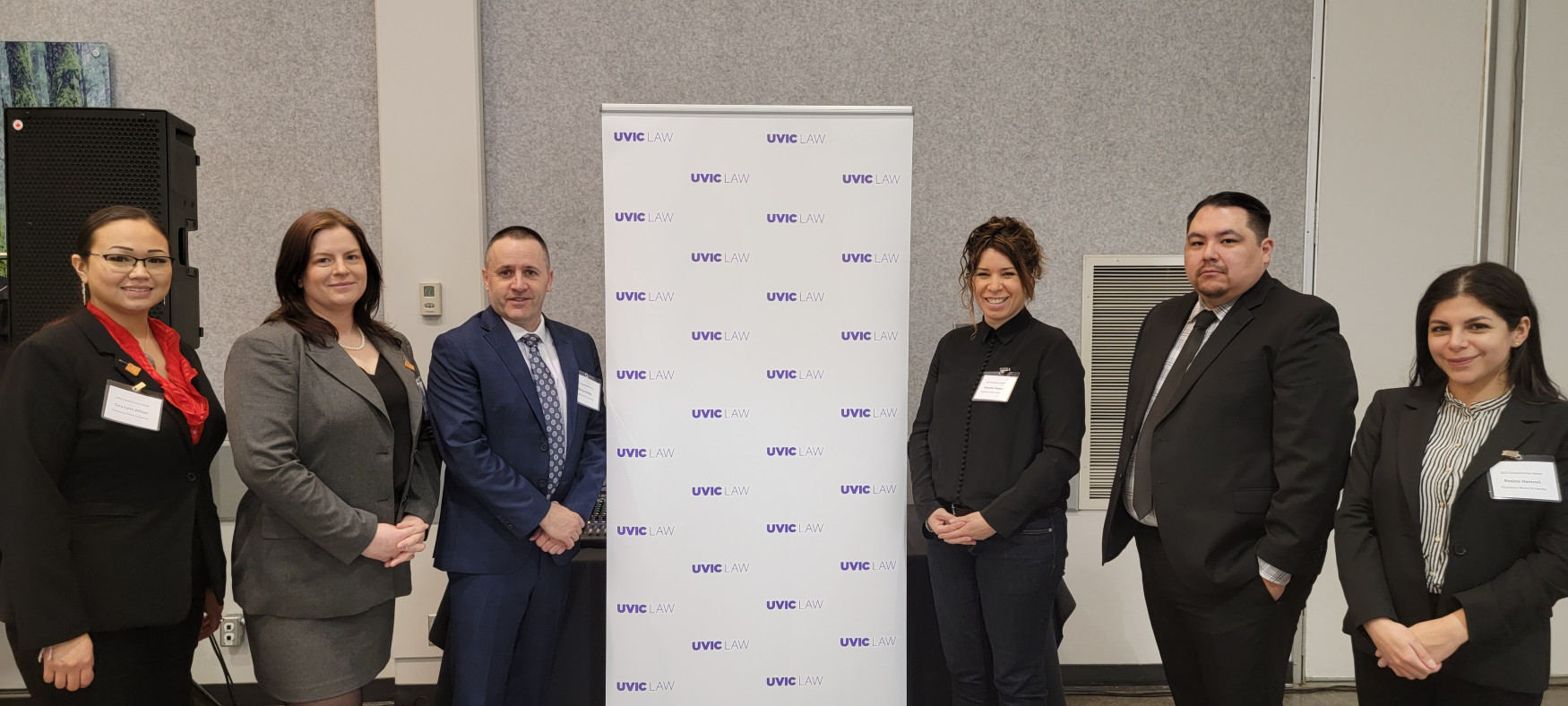One of the top Indigenous law events for Canadian universities is coming to Thompson Rivers University (TRU) for the first time next year.
The Kawaskimhon Moot encourages students to tackle a topic through an Indigenous perspective, getting their hands deep into a real-world issue of national importance. For example, this year’s moot was held at the University of Victoria, where teams took on the Coast GasLink Pipeline.
“The moot uses a talking circle style in an effort to facilitate consensus building,” said Chrystie Stewart, one of TRU Law’s coaches and TRU Law alum, along with Murray Sholty.

The TRU Law team at this year’s Kawaskimhon Moot in Victoria. Left to right: students Tara-Lynn Wilson and Bailie Copeland, coaches Murray Sholty and Chrystie Stewart, and students Rob Houle and Rosina Hamoni.
“Law schools from across Canada represent various interested parties and are required to prepare written arguments and give oral presentations on matters arising out of the moot problem. Each law school represents one or two parties participating in the negotiations. Participants present their clients’ positions to their circles and volunteer facilitators sit in the circle and gently guide the discussions, with the goal being to reach a consensus on the issues at stake. The format continues to evolve with the tone and style being set each year by the host school.”
Kawaskimhon is a Nêhiyawêwin (Cree) word that means “speaking with knowledge.” This moot is unique in that it centres Indigenous legal orders alongside federal, provincial and international law. It is consensus-based and non-adversarial.
At the moot in Victoria, the issues struck at the heart of current events with deep historic roots that are proving to be still legally relevant today.
Do the Wet’suwet’en people have title over the lands claimed by the hereditary chiefs? What rights do Wet’suwet’en people have under the United Nations Declaration on the Rights of Indigenous Peoples? Were prior consultations with band councils sufficient for the purpose of discharging the duty to consult? Did the Office of the Wet’suwet’en act properly within the scope of Wet’suwet’en law in stripping hereditary chiefs of their titles?
Additionally, there was discussion around environmental impacts, potential pipeline rerouting, First Nations equity participation, revenue sharing, employment and training, and much more.
Honing their skills
TRU’s team at the Coastal GasLink moot in Victoria was comprised of four students: Tara-Lynn Wilson (Haisla Nation from Kitamaat Village), Bailie Copeland (Mètis Nation of British Columbia from Rose Prairie), Rob Houle (Swan River First Nation) and Rosina Hamoni (North Vancouver).
“I was able to hone my writing abilities and table negotiation skills,” said Houle. “This year’s problem was made all the more relevant by focusing on the disenfranchisement of Indigenous women and how Indigenous systems sometimes insulate patriarchal policies.”
Wilson said, “The negotiation competition helped me learn how to remain impartial when approaching controversial issues. Using both Aboriginal and Indigenous laws to help me advocate for a client regardless of who they are, was a valuable learning experience. The problem we addressed was relevant to me because the pipeline runs through my hometown. Having the issue include a real-life project that directly impacts my nation made me appreciate the process and take it seriously.”
“The moot challenged me to step outside my comfort zone and speak on a controversial topic where common law and Indigenous law are both present in the issue at hand,” said Copeland.
Wilson added: “My moot partner Bailie Copeland — whose home Rose Prairie, a small rural community just north of Fort St. John, is at the opposite end of the pipeline route — was amazing and made this whole process more enjoyable.”
Personal connections to the issues
“The Kawaskimhon National Aboriginal Moot has allowed me to refine my research and oral advocacy skills,” said Hamoni.
“My coaches have been invaluable sources of support and encouragement. They spent a lot of their free time providing substantive feedback and partaking in mock negotiation sessions. Thank you to my coaches, my moot partner (Rob Houle), and other classmates (Bailie Copeland and Tara-Lynn Wilson).”
The students weren’t the only ones with personal ties to the pipeline issues on which their debates hinged. Stewart is from Tk’emlúps te Secwépemc, on whose unceded territory TRU’s Kamloops campus is located. Tk’emlúps te Secwépemc has the Trans Mountain Pipeline on its territory. Sholty’s roots are with Hagwilget Village and he was raised in Fort Fraser, both with connections to the Coastal GasLink megaproject.
Stewart and Sholty balanced their team guidance duties with successful lobbying to bring the next Kawaskimhon Moot to Kamloops. It will be the moot’s 30th anniversary since it began at the University of Toronto, and the 10th anniversary of TRU Law’s first graduating class.
This event is special for both coaches because a decade ago, as students, they both attended the 2013 Kawaskimhon Moot held that year at Western University in London. Sholty said to be a part of TRU Law as a student and now as a coach is an honour and privilege.
“We’ve been so lucky to work with such amazing students this year. Their effort, discipline and thorough preparedness did not go unnoticed by the other law schools,” he said.

